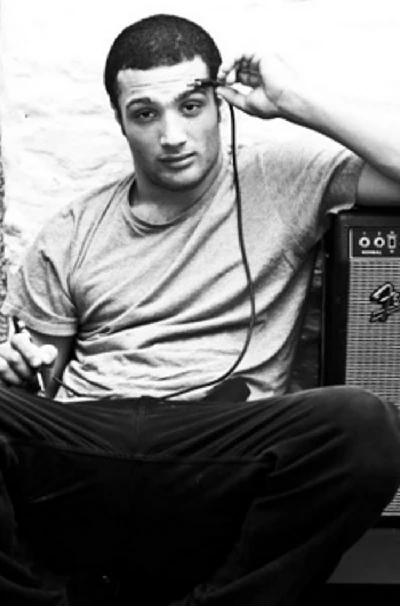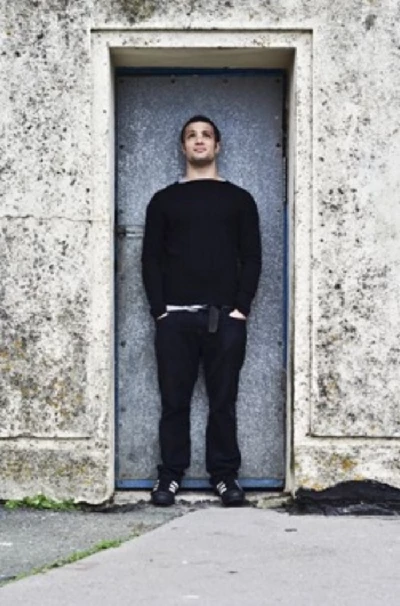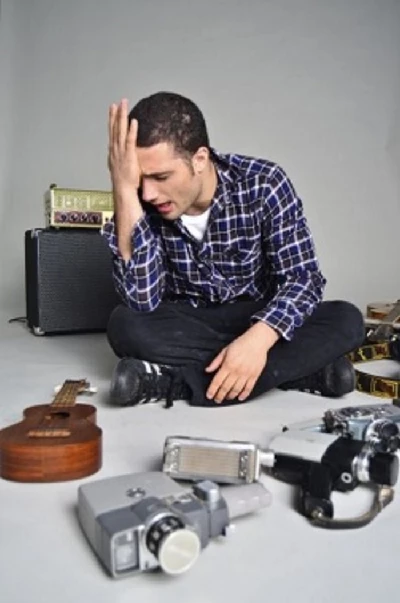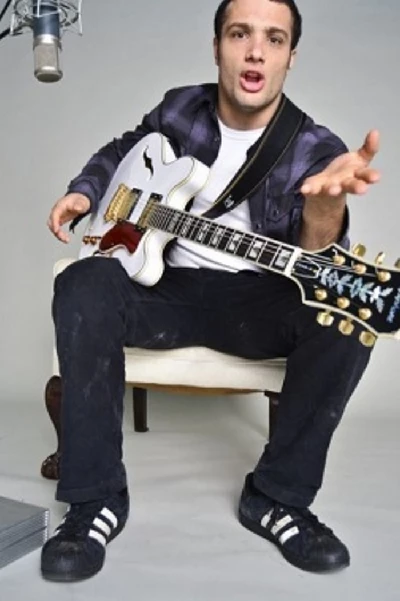published: 24 /
7 /
2012
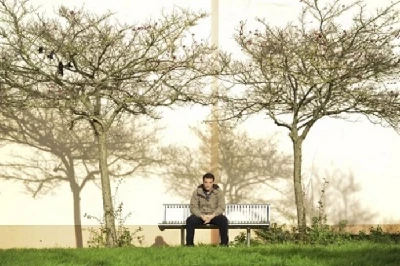
Mark Rowland chats to London-based singer-songwriter and filmmaker Cosmo Jarvis about his low budget new film, 'The Naughty Room', which is about to receive its first television showing
Article
Cosmo Jarvis is in a buoyant mood. The singer songwriter has just seen his film - the ultra low budget ‘The Naughty Room’ - on a big screen at a screening in London and in front of an audience for the first time, and he is pleased by the way it was received.
The film was made for a mere £8,000, using consumer level equipment, non-actors and an almost non-existent crew. In doing this, he follows in the footsteps of directors such as Robert Rodriguez, Christopher Nolan and Kevin Smith in making his debut feature guerrilla style. Like all of these filmmakers, Jarvis has taken a gamble and made his film based on what he had available to him, and it’s largely paid off, in particular capturing the vernacular and attitudes of apathetic British youth. The film has certainly impressed the right people, with BBC Four scheduling ‘The Naughty Room’ as part of its August programming.
Jarvis wrote, produced, directed, edited and starred in the film (as well as composing its music), about a directionless young man who discovers that his neighbour has kept her son locked in her bathroom for the past 16 years.
As depressing as that sounds, the film is largely comedic, with very strong turns from David Egan as protagonist Subaru, Tom Hannaford as his best mate Tom-Tom and Jarvis himself as Todd Kennedy, the boy locked in his mother’s bathroom.
Jarvis is constantly making short films and posting them on ‘YouTube’, alongside his music work – he has been writing songs and experimenting with film since he was twelve years old (he’s now 22). He’s now working on a second feature film, incorporating the lessons learned on ‘The Naughty Room’.
PB: How did the idea for ‘The Naughty Room’ come about?
CJ: At the very beginning, I made this really short, one-minute movie, of this character, Todd, in the bathroom, screaming for his mum, before getting out of the house and running away, and you didn’t really know why. It was shit, so I threw it away and did work for four months on other things.
Then I was on tour, and I started writing down ideas as to an overall story that would kind of maybe encapsulate the – not issues, but the possibilities that can emotionally and morally arise between parents and children, and abuse of power. So I just wrote this script, and it was way too long when I first wrote it, like 350 pages, and tonight the movie was maybe a quarter of the script that was written, but that’s just because then I didn’t know how to write a screenplay.
So basically all the writing and the choosing of the appropriate moments to move the story forward were made in editing. We shot everything – the original movie was three and a half hours, and then it was cut down to one hour 12. That initial conversation between Subaru and Todd was like an hour. I wanted it to be like real, like I would be, and then I realised you don’t need to do that. It was kind of hard getting rid of a lot of the footage, but you’ve just got to do it. The next script’s only 90 pages now, which is great.
PB: So how did you go about feeling your way through the writing process, as it was such a new discipline?
CJ: I rented this book from the library about classic form of stories, and story and character arcs and whatnot, and anti-plots. I like anti-plot movies in general, but I kind of wanted it to be a mixture of both. Often you get like an anti-plot film where you get to the end and it’s a bit unfulfilling. So I wanted it to have a bit of a wrap up at the end. I did the first draft and then went through it again, and went over all the dialogue and rewrote and rewrote and rewrote. It wasn’t ready by the time we came to shoot it, so I just kind of went with it and made any alterations with my actors on the day. Though none of the cast are professional actors. We just kind of blagged it, really.
PB: You made the film in a very low budget, guerrilla style. Was that a decision made by choice or necessity?
CJ: There was no other way it was getting made. I could’ve waited to apply for funding here and there. I make my music videos, and the budgets for the music videos are usually 10 grand – my drummer used to be in a band that was on Island Records, and 20 grand was their standard music video budget. So I was making all these videos for a few hundred quid, a grand, two grand, so there was a bit of money that was budgeted that could be used for other things.
I made this film with the money that I saved by being a cheapskate. So I got eight grand to play with. I could have waited. I could’ve tried for funding, but we’re all nobodies. There was nobody that was going to back it. Especially based on the script, because on paper, it wouldn’t have looked like that at all. I only write scripts so the actual performances and making the characters believable comes through a lot of improvisation and a lot of method acting shit that I put the guys through.
You can’t really write that down. Well, you could write: “This scene will be improvised”, but you can’t write that kind of thing down, really. It was either do it with what we had or just don’t make it, so I found a few months where I could and just sort of did it really. I assembled the people who were able, my unemployed friends and my brother and whoever was about.
PB: With such a tight budget, I imagine you had to cut corners. Which were the biggest challenges during the shoot?
CJ: Not having enough people in charge of the required departments. There was no continuity. There was a girl who did makeup and she wasn’t always available, so we’d have to do it ourselves, or get someone else to learn how to do it. You do need a designated sound recordist and a designated boom operator, a designated light man, and we didn’t have that.
There was one scene where we used light, and that was the initial party scene, the first scene in the movie. After that we were like, “Fuck this, there’s no way we’re going to be able to set these up every day.” So we ditched the whole thing, but that’s the good thing with DSLRs, though, because you can shoot in low light and it looks okay. Every corner was cut pretty much, because there was no way of getting people to do it, especially because I could give them less than thirtyquid a day, and they were long days. So it was a matter of everybody grabbing what they can and seeing what they can do.
PB: The main female characters in the film, the mothers of the two main characters, are steeped in sadness, and in one case, seriously disturbed. What was the inspiration for that?
CJ: My family were pretty fucked, like always, so I think a lot of the mother characters I think derived from my encounters with women, sort of. I was always really conscious of not writing realistic women, because you must get that in movies a lot. I just tried to make it like… plausible. My mum, she saw it and said, ‘Is this fucking movie about me?” She went nuts when she first read the script. “It’s so unrealistic. It’s fucking bollocks, rah, rah, rah,” but that’s because she’s my mum and she was connecting it to herself.
PB: Where did you find the actors who played those parts?
CJ: The woman who played Subaru’s mother, she lives in a village away from me. It was two days from shooting and we still didn’t have someone for the part. I was ringing round, putting things on Facebook: “Can anyone act, or would like to try to act?” She had done a drama course years ago and was up for it. The other woman, who played the other mum, she works as a secretary in a sound recording place in Plymouth near where I live. I went to her house and did a little read through, and she was up for doing it. So it was pretty much purely by chance.
A lot of it came from them being comfortable in doing what they wanted to do. When you’re working in that situation when you’re not paying people hundreds of thousands to work, you can’t be like, “I want it to be like this.” You have to allocate them the space to be free within and hope they can do it. I think they did, considering the circumstances.
PB: There are two scenes that would be tough to do on your budget: the break-in scene and the car crash. How did you set them up?
CJ: The character Subaru’s house was my grandma’s house, and above her flat was a bloke called Bill’s flat, who I’d never met. He’s obviously rich, and it’s like a second home for him, like a summer home. I asked my gran if we could use the house upstairs, and she contacted this Bill guy, because she’s the keeper of the keys for the flat block, and he apparently says yes. He still doesn’t know that a movie has been shot in his house. He thinks that ‘The Naughty Room’ is me with a camera taking some pictures in his house.
Every day, when we were shooting, we would take his actual door off – my mate Harvey, he’s a joiner, so he’d take the door off, and we went down to the recycling centre and got two of the same door. We wouldn’t even bolt it on. We’d just prop it up and then that would be the door. For the smashing, because it didn’t lock properly, we tied a bit of string to one bit. If he was hitting it with a sledgehammer, it would’ve just fallen over. So when he was smashing it, there was actually two guys round the other side holding a bit of string, just holding it together. On that scene as well, Dave, who played Subaru, when he first did the scene the sledgehammer was so heavy that it pulled his arm through the glass and sliced up all his wrist and he was pissing out blood. It was pretty bad.
With the car crash, there was a testing driving area for learner drivers in Exeter, and we just contacted them and asked us if it was alright to do this thing. That was the only thing we had to do a risk assessment for on the whole movie. They were like, “Yeah, it’s cool.” So we got ourselves some yellow jackets and we found a guy who can crash cars, who lives in the next town from me. He did it for 400 quid – it was the most expensive scene of the film.
We got two old cars out of an Autotrader for like 50 quid. My mate Harry, who was the production designer, my drummer, knew a guy who worked on a farm who had a car trailer, so we used that to transport these cars up there, because they weren’t road legal. And we just crashed them. I’d never shot anything like that in my life. I was expecting the crash to come out way better, to be honest, but it worked out. It was all a blag.
The other thing is, if you paused it, because I was aware that it might come out on DVD at some point. There’s a guy in Plymouth near me, called Serge, the impact shot was 70 frames, so I gave him these 70 frames and asked him to animate some silhouettes in the car, so if anybody does pause it, it looks like there’s people in the car. That’s the visual effect, which is why there’s only one.
PB: Is it true that the BBC has picked up your film? When is it being shown?
CJ: It’s going to be shown on BBC Four in August,
PB: How did that come about?
CJ: I’m not exactly sure, but I’m pretty sure that one of the radio pluggers, a guy called Gareth, got it to the head of BBC Four, who had been a fan of some of my music videos before. He saw the movie, and was also told how it was made and what it was made for, and he thought it was alright, and said that he’d like to show it on the channel, which was more than I’d ever hoped for. That’s for sure. I don’t know how that’s going to go, but I hope that people like it.
PB: Have you always wanted to make films as well as music?
CJ: The three things, music, film and acting, I always do them on one level or another. That film itself was never my ultimate goal or anything, by the time I’d written it, I was like, “There’s no reason why I can’t make this with what I’ve got,” so I did it.
I’ve just finished writing a script for another movie, called ‘Abandon Hope’, which, if there are more funding options available, then I’ll take them, but if not, then I’ll do it for the same amount I did this one for, if not less. Money obviously helps a hell of a lot, but you could do it for less. Hopefully, with this BBC Four thing, it might make doing the next one a little bit easier, because having those kind of monsters vouch for you helps, so I don’t know. I’ll always make shit one way or another.
PB: What’s the difference between making a film and making an album? Are you inspired by the same things for both disciplines?
CJ: You can be hell of a lot more abstract with a song. You can be abstract with a film, too, but you risk ¬– like some of Lars Von Trier’s work – you risk people saying, “Why do they make this?” I love his work a lot, but a lot of my mates don’t. I’m like, “You’ve got to see this movie, ‘Antichrist’,” and they’re like, “I don’t get it.”
So with a film, I think it has to be a lot more detailed. You need to look at it with a lot more scrutiny to make sure that everything you’re putting in is there for a reason. Whereas in a song, because it’s coming straight out of you, and you’re representing yourself as the artist, and it’s one voice: “This is my idea. This is my metaphor for life,” or whatever it is. You’re free to deviate or meander however you feel is necessary, because you have the constant forward motion of the music to aid your idea. So if you have some fucked up, abstract lyrics in there that don’t really make a lot of sense to a lot of people.
The music is a huge factor that may help them relate to the song. With film, you can’t always do that, because it’s an image you’re showing people. But with film, I’m always thinking about the music I’m going to write for the film as well to help tell the story. Or if there’s a funny thing happening on screen, but it actually has really serious connotations.I’m thinking about the piece of music I’m going to write to help convey that emotional state.
So it’s kind of the same. It’s just that film takes way longer. Now I know how a screenplay works and I know how I can round up my crew, so we’ll write the next script and then we’ll go through it.
PB: Thank you.
'The Naughty Room' will be shown on BBC4 at 10 p.m. on Monday 20th August
Picture Gallery:-
